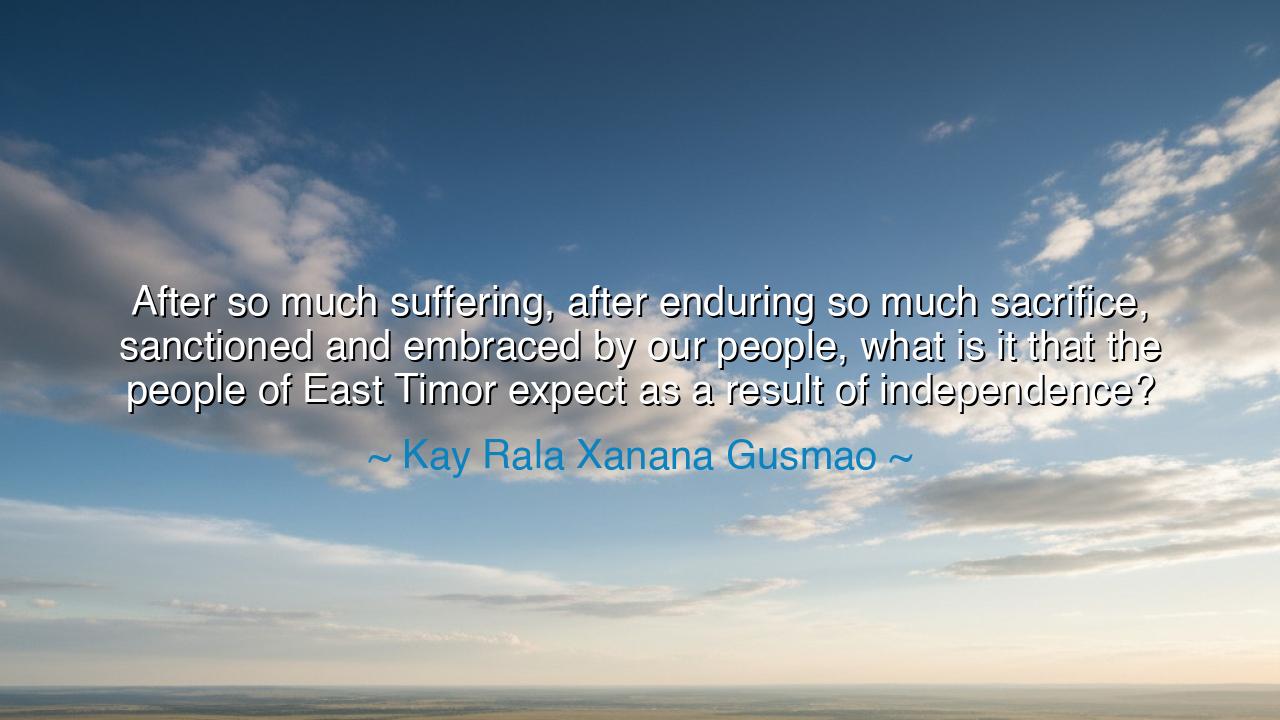
After so much suffering, after enduring so much sacrifice
After so much suffering, after enduring so much sacrifice, sanctioned and embraced by our people, what is it that the people of East Timor expect as a result of independence?






When Kay Rala Xanana Gusmão asked, “After so much suffering, after enduring so much sacrifice, sanctioned and embraced by our people, what is it that the people of East Timor expect as a result of independence?” he was not merely posing a question — he was summoning reflection, both for his nation and for all who have fought for freedom. His words carry the weary wisdom of one who has seen liberty won through pain, blood, and endurance, and who understands that independence is not the end of struggle, but its transformation. In this single question, Gusmão captures the eternal paradox of freedom: that after the chains are broken, the soul must still learn how to live unbound.
The origin of this quote lies in the aftermath of East Timor’s long and harrowing journey to nationhood. For centuries, the island had been a colony of Portugal, and after that, it endured invasion and occupation by Indonesia beginning in 1975. For twenty-four years, the Timorese people endured massacres, famine, and the silencing of their voices — yet they never abandoned the dream of self-determination. Xanana Gusmão, once a poet and guerrilla commander, became the symbol of that resistance, spending years in prison for the cause of his people. When independence was finally achieved in 2002, his question echoed through the newly born nation: what do we expect from freedom, and how shall we build it?
Gusmão’s words remind us that independence is both a gift and a burden. It demands as much wisdom in peace as courage in war. Many nations have discovered this truth too late — that the dawn of liberation, so radiant with hope, is followed by the long day of responsibility. For centuries, oppressed peoples have believed that freedom would be the cure for all suffering. Yet, as Gusmão understood, freedom is not a miracle; it is a discipline. It is not given whole, but built, brick by brick, through justice, education, and compassion. The people who fought for independence must then learn to fight again — not against oppressors, but against poverty, corruption, and despair.
History provides many mirrors to this truth. When India won its freedom from British rule in 1947, joy filled the streets — but soon came partition, bloodshed, and hunger. Independence had been achieved, yet peace remained fragile. Likewise, when the United States declared liberty in 1776, its founders soon discovered that freedom without unity could unravel into conflict and inequality. The same question Gusmão asked could have been asked in Philadelphia, or in Delhi, or in any place where a people have cast off their chains: “Now that we are free, what kind of nation will we become?” His words remind us that the greatest revolution is not fought with weapons, but with the conscience of the free.
In East Timor, the struggle did not end with victory. The land still bore scars — burned villages, broken families, and the heavy shadow of trauma. Gusmão’s question was a call to healing: to remind his people that independence is not revenge, but renewal. The purpose of freedom, he suggested, was not to divide or dominate, but to rebuild trust, dignity, and compassion. The hero of war must become the servant of peace; the fighter must become the builder. For a nation that has suffered much, the truest triumph is not vengeance, but the creation of a just and merciful society.
The ancient philosophers would have nodded in agreement. Aristotle taught that freedom without virtue destroys itself, and Confucius taught that a state cannot stand unless its people learn harmony after hardship. So too did Gusmão’s question carry that ancient wisdom — that the test of a people is not how bravely they win freedom, but how wisely they govern it. The warriors of East Timor had already proven their courage; now they were asked to prove their wisdom — to ensure that the sacrifice of generations would not be wasted in disunity or greed.
So, my children of the future, hear this teaching: independence is not a gift to enjoy, but a responsibility to uphold. Every nation, every person who wins freedom, must ask Gusmão’s question anew: What do we expect of independence? Do we seek only comfort, or do we seek character? Do we rest in victory, or do we labor in virtue? Let us learn from East Timor’s long night and bright dawn — that freedom is sacred only when it gives life to justice, dignity, and love. For the price of liberty is not paid once, but every day thereafter — by those who remember that freedom is not merely to live as one pleases, but to live as one ought.






AAdministratorAdministrator
Welcome, honored guests. Please leave a comment, we will respond soon